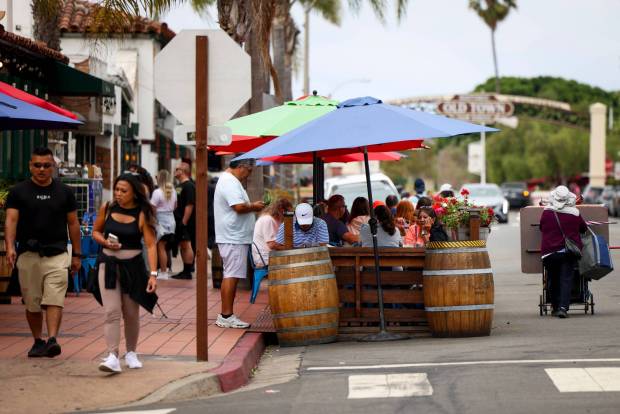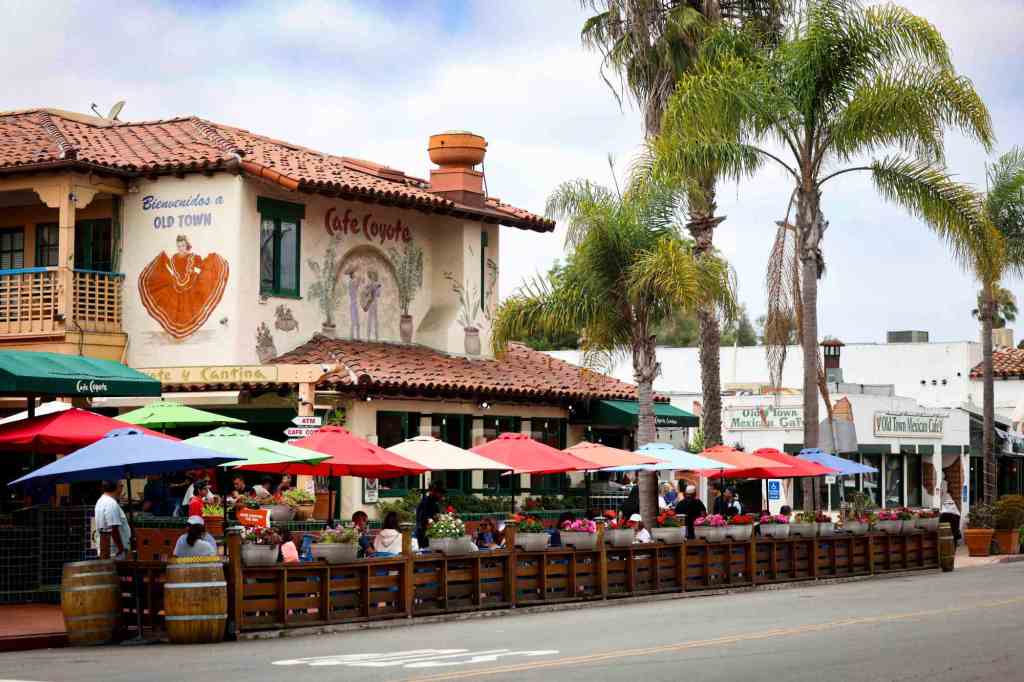San Diego is proposing looser rules for sidewalk cafes in Old Town, housing developments near MCAS Miramar, after-school child care facilities and mixed-use housing projects that include churches.
The proposals — part of a sprawling annual update to city land rules — would also increase code violation fines for the first time since 2017, ban storage facilities in City Heights and soften how dense housing impacts neighborhoods.
Other proposals include raising fines for violating vacation rental rules, strengthening a ban on cannabis outlets using leaf images in their signage and making several changes to the city’s Complete Communities housing development incentive.
The proposals would change the controversial incentive by adding for-sale housing as an option, encouraging larger units by amending a fee waiver and toughening requirements when a project replaces existing housing.
Some of the proposals would apply only in downtown, including a policy to make it easier to create rooftop gardens and new incentives to build for-sale housing, preserve mature trees and pursue development on decaying C Street.
Another downtown-only proposal would encourage entertainment venues — which typically leave street-level storefronts desolate during the day — to relocate underground so the ground floor can be occupied by a daytime business.
The package includes 106 citywide proposals and 36 additional proposals that apply only in downtown.
 People dine at Cafe Coyote’s outdoor sidewalk cafe on Friday, Aug. 15, 2025 in San Diego, CA. (Meg McLaughlin / The San Diego Union-Tribune)
People dine at Cafe Coyote’s outdoor sidewalk cafe on Friday, Aug. 15, 2025 in San Diego, CA. (Meg McLaughlin / The San Diego Union-Tribune)
San Diego is the only city in the region that updates its zoning code annually with a large batch of policy changes. Other cities make such changes one at a time.
Critics have pointed out that adjusting significant regulations in such a large batch can shield the changes from the level of scrutiny they might receive if they were debated individually.
City officials say comprehensively updating the zoning code each year allows them quickly to make small modifications that streamline regulations and adjust policies that may have had unintended consequences.
They say it would be a bureaucratic nightmare to have each proposal go to the Planning Commission, the City Council’s Land Use and Housing Committee and then the full City Council for final approval.
Many of the changes simply update city rules to match amended state law or make minor corrections to city rules that have little impact.
But some seemingly minor changes matter, including some of this year’s proposals.
They include softening density bonus rules near transit, boosting transparency at the Planning Commission, updating developer fee rules and streamlining approvals of land-use changes recommended by the Coastal Commission.
One proposal in the new package that’s likely to make a big impact is softening the rules in Old Town for sidewalk cafes and “streeteries” — outdoor dining in parts of the street that used to be used as parking spaces.
Only three venues in the tourist-heavy neighborhood — Cafe Coyote, Don Pietro and Tahona — offer sidewalk seating, and they do so under temporary rules created during the COVID-19 pandemic that require annual renewals.
Fred Grand, leader of the Old Town Chamber of Commerce and a member of the neighborhood planning group, said he believes the change will attract strong support.
“Anything to enhance our streetscapes we’d be all for,” Grand said Friday.
He said the only potential concern would be impacts on public safety and loss of parking.
Grand said more sidewalk cafes would dovetail with other recent Old Town improvements, including a new gateway sign on San Diego Avenue and upgrades to Heritage Park.
Another key proposal is encouraging more dense housing near MCAS Miramar by softening rules that seek to limit population near airports for safety reasons. That change would apply to projects of up to 60 units per acre.
Another proposal would extend to after-school child care businesses all the city’s recent incentives and rules changes for all-day child care centers.
And one key change that updates city rules to comply with state law would slash parking requirements in half when housing is built in conjunction with churches and other “places of religious assembly.”
The package would also increase fines for violations of the city’s municipal code by an unspecified amount. City officials said the current limit of $10,000 per violation, with a total cap of $400,000, has not been updated since 2017.
Another change would prohibit new storage facilities in the Mid-City area, including El Cajon Boulevard and University Avenue east of Interstate 15. The goal of the ban is to make the area less car-dependent.
One of the package’s more complex proposals is something called “angled transition planes,” which aim to preserve neighborhood character by prohibiting the development of new high-density projects next to low-density residential or open space.
The package also includes a proposal to strengthen a ban on cannabis outlets using leaves in their signage, which must only include letters under existing city rules.
Phil Rath, the leader of a consortium of local cannabis outlets, said Friday that his group is unaware of any violations of the existing rule and isn’t sure why the current rules aren’t sufficient.
On Complete Communities, which lets developers build structures as much as four times larger than a property’s zoning typically allows, the package would expand the options for developers beyond for-rent apartments to allow them to offer for-sale units.
It would also encourage larger apartments by eliminating an existing development impact fee waiver if units are less than 500 square feet, and it would discourage projects that wipe out existing housing by requiring the new project to have at least as many total bedrooms as the housing it would replace.
On developer fees, the package would stipulate that new citywide fees would be subject to the same inflation-indexed increases that individual neighborhood fees have used for many years.
On Planning Commission transparency, the panel would have to give twice as much public notice before considering changes to development regulations or zoning changes — 20 days rather than 10 days.
On changes to density bonuses near transit, the package would change the frequency that a bus route must serve an area from every 15 minutes to every 20 minutes.
On changes to Coastal Commission policy, the package would streamline final approval of changes the commission makes to new city policies by allowing the City Council to accept such changes without first sending them to the Planning Commission.
Members of the public are invited to comment on any of the proposals at the city’s website. No deadline for comments has been revealed.
Typically, the city will remove some of the proposals, revise others and possibly add some new proposals before the package is presented to the Planning Commission sometime later this year.
Two years ago, public hearings on the 2023 package of reforms were dominated by debate over a proposal to soften rules allowing taller apartment buildings and more backyard units when a property is near mass transit.
The City Council eventually voted 5-4 to approve the change, which extended the relaxed rules to properties as far as 1 mile away from a transit line, instead of the half-mile requirement previously in place.
None of the proposals in the 2024 package attracted the same level of attention.
But a footnote in the 2019 package stirred controversy this winter. That footnote essentially allowed more single-family homes to be built on smaller lots than were previously allowed — but only in a single community planning area in Encanto.
The revelation of that footnote, which was approved apparently without anyone from Encanto being aware of it, further fueled arguments that the city should not be approving such a large package of policy changes all together.
